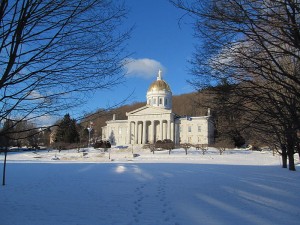By Johanna Miller
The 2014 legislative session is right around the corner and lawmakers are likely to consider several important energy issues, including funding weatherization and heating efficiency programs for low-income residents, fixing the state’s successful, but currently threatened, net metering program and assuring the continued financial stability of the Clean Energy Development Fund. People who care about positive action on clean energy should closely follow legislative efforts this year and beyond. As always, what happens — or does not — under the Golden Dome will take us forward or set us back on clean energy and climate-action solutions.
A few energy issues likely on this year’s agenda include:
- How and Whether to Fund Weatherization Programs. The state set a goal to weatherize 80,000 homes by 2020. Unfortunately, at current investment levels, Vermont is on a trajectory to miss that goal by half. This means many Vermonters will hemorrhage heat out of their leaky homes, squeezing already tight budgets. A real commitment to heating efficiency in Vermont is essential. At the least, in 2014, finding sufficient funding for the low-income weatherization program is imperative before current funding levels fall off and weatherization agencies are forced to lay off workers and cut the number of Vermonters they can help in 2015.
- Find a Fix for Net Metering. Net metering is Vermont’s most successful renewable energy program, allowing Vermonters to generate their own clean, local power. Here is the rub, though: currently, there is a statutory cap on net-metered projects. This means that many Vermonters who want to go solar can’t do so because some utilities are no longer required to accept — and are no longer taking — net-metered customers.
This roadblock is keeping many Vermont families, schools, municipalities and businesses from installing solar systems, it’s slowing down larger-scale investments in clean energy and it’s creating uncertainty in an already-stressed investor market. Lawmakers are poised to consider this issue, and it’s hoped that they will support some promising solutions, such as:- Exempting residential systems under 15kW from counting towards any cap.
- Raising the cap for projects over 15kW to 15 percent.
- Maintaining the current or a similar incentive structure for net-metered projects.
- Clarify Municipal Taxation of Solar Projects. In 2012, the Legislature established a state education property tax of $4/kW of capacity for solar projects over 10 kW. How towns should assess the value of solar projects for municipal property tax purposes has been unclear, however, and municipalities are doing it differently. This has created confusion, unintended consequences and added more uncertainty for people trying to develop homegrown renewable electricity. A simple, predictable and affordable solution is needed to facilitate homes, businesses, schools and towns going solar.
- Fund the Clean Energy Development Fund. The CEDF has been in place for 10 years, effectively stimulating investment in small-scale renewable energy and providing funding for certifying solar installers. Funding for the CEDF has been uncertain and uneven over the years and, at this time, no source of funding has been identified for it next year. Without action, this important small-scale, clean energy-catalyzing fund could be eliminated altogether. Finding funding for this program is pivotal.
Vermont set important statutory goals of cutting our greenhouse gas emissions 75 percent by 2050 and getting 90 percent of all our energy from renewable sources by 2050. As a nation, and as a state, getting off of fossil fuels as quickly, seamlessly and affordably as possible is imperative for long-term economic security and the stability of the global climate. That will require increasing efforts to reduce energy consumption and, simultaneously, increasing the diversity and distribution of clean, renewable energy resources. These and other important legislative initiatives in 2014 and beyond are essential to charting that course.
For more information and to get involved, visit www.vnrc.org or contact VNRC’s Energy Program Director Johanna Miller at jmiller@vnrc.org or 802-223-2328 ext. 112.









Leave a Reply